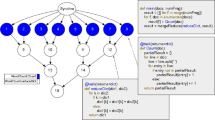Abstract
To fully realize its potential, distributed supercomputing requires abstractions and environments facilitating development of efficient applications. In this paper we present PARDIS, a system which addresses this demand by providing support for interoperability of PARallel DIStributed applications. The design of PARDIS is based on the Common Object Request Broker Architecture (CORBA). Like CORBA, it provides interoperability between heterogeneous components by specifying their interfaces in a meta-language, the CORBA IDL, which can be translated into the language of interacting components. However, PARDIS extends the CORBA object model by introducing SPMD objects representing data-parallel computations. This extension allows us to build interactions involving data-parallel components, which exchange distributed data structures whose definitions are captured by distributed sequences. We present microbenchmark results which evaluate the performance potential of SPMD objects for data structures of diverse complexity and different network configurations. Based on these results, we conclude that while encapsulating the existence of multiple interactions SPMD objects also allow their efficient utilization, and therefore constitute a useful abstraction.
Similar content being viewed by others
References
S. Atlas, S. Banerjee, J.C. Cummings, P.J. Hinker, M. Srikant, J.V.W. Reynders and M. Tholburn, POOMA: A high performance distributed simulation environment for scientific applications, in: Supercomputing' 95 Proceedings(December 1995).
P. Beckman and D. Gannon, Tulip: A portable run-time system for object-parallel systems, in: Proceedings of the 10th International Parallel Processing Symposium(April 1996) pp. 532-536.
F. Berman, R. Wolski, S. Figueira, J. Schopf and G. Shao, Application-level scheduling on distributed heterogeneous networks, in: Supercomputing' 96 Proceedings(November 1996).
T. DeFanti, I. Foster, M. Papka, R. Stevens and T. Kuhfuss, Overview of the I-WAY: wide-area visual supercomputing, The International Journal of Supercomputer Applications and High Performance Computing 10(2) (1996) 123-131.
S.M. Figueira and F. Berman, Modeling the effects of contention on the performance of heterogeneous applications, in: Proceedings of the 5th IEEE International Symposium on High Performance Distributed Computation(August 1996).
I. Foster, J. Geisler, C. Kesselman and S. Tuecke, Multimethod communication for high-performance metacomputing applications, in: Supercomputing' 96 Proceedings(November 1996).
I. Foster and C. Kesselman, Globus: A metacomputing infrastructure toolkit, in: The International Journal of Supercomputer Applications and High Performance Computing 11(2) (1997) 115-128.
I. Foster, C. Kesselman, R. Olson and S. Tuecke, Nexus: An interoperability layer for parallel and distributed computer systems, Technical Memorandum ANL/MCS-TM-189 (1994).
I. Foster, D. Kohr, R. Krishnaiyer and A. Choudhary, Double standards: bringing task parallelism to HPF via the message passing interface, in: Supercomputing' 96 Proceedings(November 1996).
D. Gannon, P. Beckman, E. Johnson, T. Green and M. Levine, HPC++ and the HPC++Lib toolkit, in: Languages, Compilation Techniques and Run Time Systems(Recent Advances and Future Perspectives) (1997, to appear).
A.S. Grimshaw and W.A. Wulf, Legion - A view from 50,000 feet, in: Proceedings of the 5th IEEE International Symposium on High Performance Distributed Computation(August 1996).
W. Gropp, E. Lusk, N. Doss and A. Skjellum, A high performance, portable implementation of the MPI message passing interface standard, Tech. Report ANL/MCS-TM-213, Argonne National Laboratory (1996).
K. Keahey and D. Gannon, PARDIS: A parallel approach to CORBA, in: Proceedings of the 6th IEEE International Symposium on High Performance Distributed Computation(August 1997).
K. Keahey and D. Gannon, PARDIS: CORBA-based architecture for application-level parallel distributed computation, in: Supercomputing' 97 Proceedings(November 1997).
Message Passing Interface Forum, MPI: A Message-Passing Interface Standard (June 1995).
M.L. Norman, P. Beckman, G.L. Bryan, J. Dubinski, D. Gannon, L. Hernquist, K. Keahey, J.P. Ostriker, J. Shalf, J. Welling and S. Yang, Galaxies collide on the I-WAY: An example of heterogeneous wide-area collaborative supercomputing, The International Journal of Supercomputer Applications and High Performance Computing 10(2) (1996) 132-144.
W.G. O'Farrell, F.Ch. Eigler, S.D. Pullara and G.V. Wilson, Parallel Programming Using C++(MIT Press, 1996) chapter ABC++.
OMG, The common object request broker: architecture and specification, Revision 2.0, OMG Document (June 1995).
D. Schmidt, A. Gokhale, T. Harrison and G. Parulkar, A high-performance endsystem architecture for real-time CORBA, IEEE Communications Magazine 14(2) (1997).
R. van Renesse, K.P. Birman, R. Friedman, M. Hayden and D.A. Karr, A framework for protocol composition in horus, in: Proceedings of Principles of Distributed Computing(1995).
Author information
Authors and Affiliations
Rights and permissions
About this article
Cite this article
Keahey, K., Gannon, D. Developing and evaluating abstractions for distributed supercomputing. Cluster Computing 1, 69–79 (1998). https://doi.org/10.1023/A:1019017028237
Issue Date:
DOI: https://doi.org/10.1023/A:1019017028237




